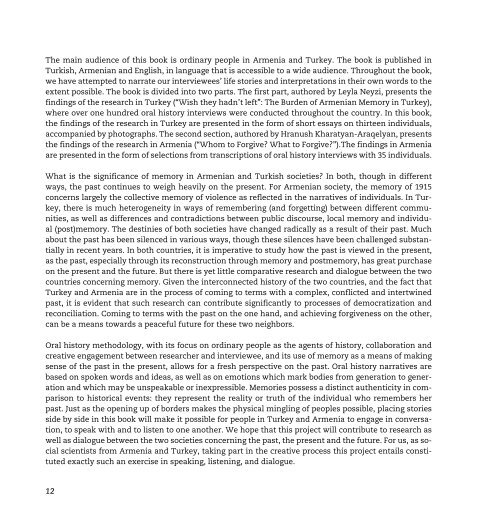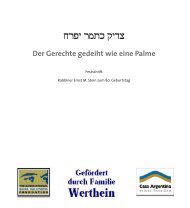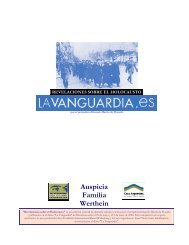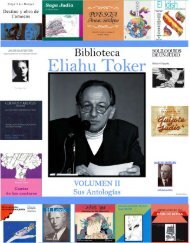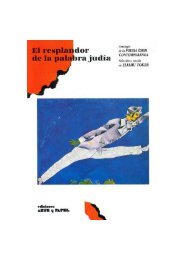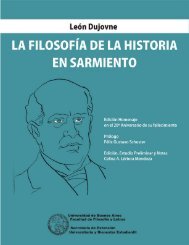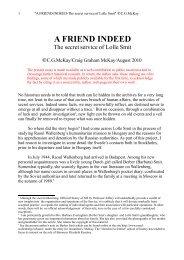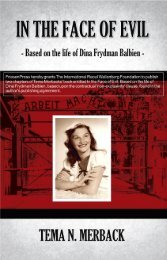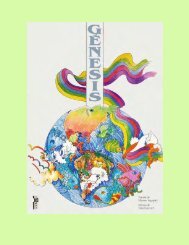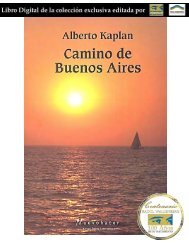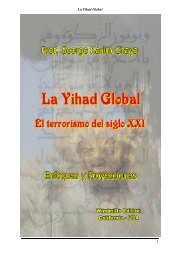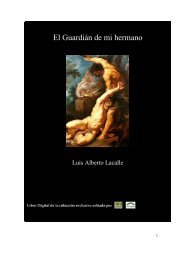Speaking to One Another - The International Raoul Wallenberg ...
Speaking to One Another - The International Raoul Wallenberg ...
Speaking to One Another - The International Raoul Wallenberg ...
- No tags were found...
You also want an ePaper? Increase the reach of your titles
YUMPU automatically turns print PDFs into web optimized ePapers that Google loves.
<strong>The</strong> main audience of this book is ordinary people in Armenia and Turkey. <strong>The</strong> book is published inTurkish, Armenian and English, in language that is accessible <strong>to</strong> a wide audience. Throughout the book,we have attempted <strong>to</strong> narrate our interviewees’ life s<strong>to</strong>ries and interpretations in their own words <strong>to</strong> theextent possible. <strong>The</strong> book is divided in<strong>to</strong> two parts. <strong>The</strong> first part, authored by Leyla Neyzi, presents thefindings of the research in Turkey (“Wish they hadn’t left”: <strong>The</strong> Burden of Armenian Memory in Turkey),where over one hundred oral his<strong>to</strong>ry interviews were conducted throughout the country. In this book,the findings of the research in Turkey are presented in the form of short essays on thirteen individuals,accompanied by pho<strong>to</strong>graphs. <strong>The</strong> second section, authored by Hranush Kharatyan-Araqelyan, presentsthe findings of the research in Armenia (“Whom <strong>to</strong> Forgive? What <strong>to</strong> Forgive?”).<strong>The</strong> findings in Armeniaare presented in the form of selections from transcriptions of oral his<strong>to</strong>ry interviews with 35 individuals.What is the significance of memory in Armenian and Turkish societies? In both, though in differentways, the past continues <strong>to</strong> weigh heavily on the present. For Armenian society, the memory of 1915concerns largely the collective memory of violence as reflected in the narratives of individuals. In Turkey,there is much heterogeneity in ways of remembering (and forgetting) between different communities,as well as differences and contradictions between public discourse, local memory and individual(post)memory. <strong>The</strong> destinies of both societies have changed radically as a result of their past. Muchabout the past has been silenced in various ways, though these silences have been challenged substantiallyin recent years. In both countries, it is imperative <strong>to</strong> study how the past is viewed in the present,as the past, especially through its reconstruction through memory and postmemory, has great purchaseon the present and the future. But there is yet little comparative research and dialogue between the twocountries concerning memory. Given the interconnected his<strong>to</strong>ry of the two countries, and the fact thatTurkey and Armenia are in the process of coming <strong>to</strong> terms with a complex, conflicted and intertwinedpast, it is evident that such research can contribute significantly <strong>to</strong> processes of democratization andreconciliation. Coming <strong>to</strong> terms with the past on the one hand, and achieving forgiveness on the other,can be a means <strong>to</strong>wards a peaceful future for these two neighbors.Oral his<strong>to</strong>ry methodology, with its focus on ordinary people as the agents of his<strong>to</strong>ry, collaboration andcreative engagement between researcher and interviewee, and its use of memory as a means of makingsense of the past in the present, allows for a fresh perspective on the past. Oral his<strong>to</strong>ry narratives arebased on spoken words and ideas, as well as on emotions which mark bodies from generation <strong>to</strong> generationand which may be unspeakable or inexpressible. Memories possess a distinct authenticity in comparison<strong>to</strong> his<strong>to</strong>rical events: they represent the reality or truth of the individual who remembers herpast. Just as the opening up of borders makes the physical mingling of peoples possible, placing s<strong>to</strong>riesside by side in this book will make it possible for people in Turkey and Armenia <strong>to</strong> engage in conversation,<strong>to</strong> speak with and <strong>to</strong> listen <strong>to</strong> one another. We hope that this project will contribute <strong>to</strong> research aswell as dialogue between the two societies concerning the past, the present and the future. For us, as socialscientists from Armenia and Turkey, taking part in the creative process this project entails constitutedexactly such an exercise in speaking, listening, and dialogue.12


